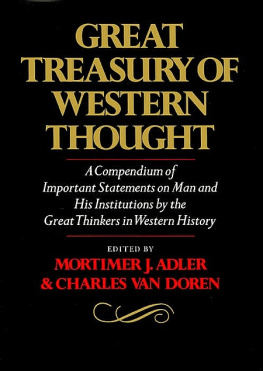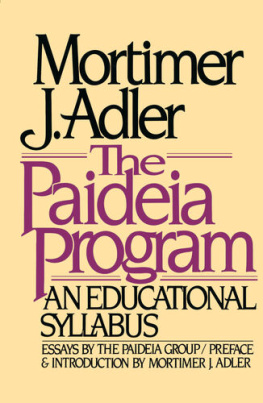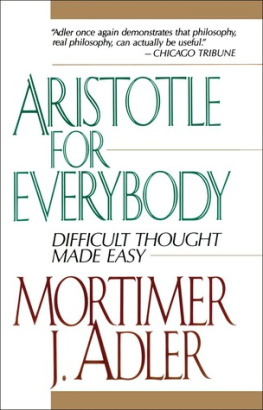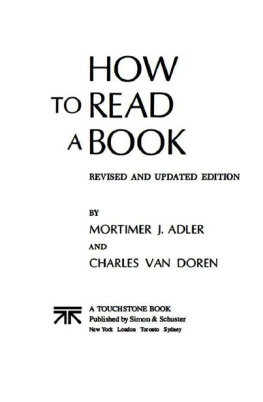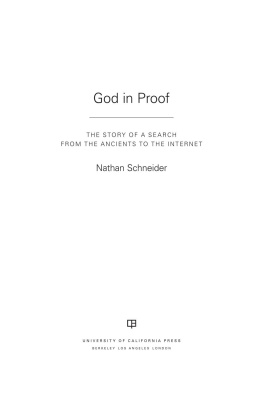How to Prove There
Is a God
Books by Mortimer Adler
Dialectic (1927) Music Appreciation (1929) The Nature of Judicial Proof (with Jerome Michael, 1931) Crime, Law, and Social Science (with Jerome Michael, 1933) Diagrammatics (with Maude Phelps Hutchins, 1935) Art and Prudence (1937) What Man Has Made of Man (1937) Saint Thomas and the Gentiles (1938) How to Read a Book (1940) The Philosophy and Science of Man (1940) Problems for Thomists: The Problem of Species (1940) Scholasticism and Politics (as editor, 1940) A Dialectic of Morals (1941) How to Think about War and Peace (1944) A Syntopicon: An Index to The Great Ideas (as editor, 2 volumes, 1952) Research on Freedom (2 volumes, 1954) The Idea of Freedom (volume 1, 1958) The Revolution in Education (with Milton Mayer, 1958) The Capitalist Manifesto (with Louis O. Kelso, 1958) The New Capitalists (with Louis O. Kelso, 1961) Great Ideas from the Great Books (1961) The Idea of Freedom (volume 2, 1961) The Great Ideas Today (as editor, with Robert Hutchins, 1961) Gateway to the Great Books (as editor, 10 volumes, with Robert Hutchins, 1963) (The Conditions of Philosophy (1965) The Difference of Man and the Difference It Makes (1967) The Annals of America (as editor, 21 volumes, 1968) The Time of Our Lives (1970) The Common Sense of Politics (1971) Propaedia (as editor, 30 volumes, 1974) The American Testament (with William Gorman, 1975) Some Questions about Language (1976) Philosopher at Large (1977) Reforming Education (1977) Great Treasury of Western Thought (as editor, with Charles Van Doren, 1977) Aristotle for Everybody (1978) How to Think about God (1980) Six Great Ideas (1981) The Angels and Us (1982) (The Paideia Proposal (1982) How to Speak/How to Listen (1983) Paideia Problems and Possibilities (1983) A Vision of the Future (1984) The Paideia Program (with members of the Paideia Group, 1984) Ten Philosophical Mistakes (1985) A Guidebook to Learning (1986) We Hold These Truths (1987) Intellect: Mind over Matter (1990) Truth in Religion (1990) Haves Without Have-Nots (1991) Desires, Right, and Wrong (1991) A Second Look in the Rearview Mirror (1992) The Great Ideas (1992) The Four Dimensions of Philosophy (1993) Art, the Arts, and the Great Ideas (1994) Adlers Philosophical Dictionary (1995) How to Think about The Great Ideas (2000) How to Prove There Is a God (2011)
How to
Prove There Is
a God
Mortimer J. Adlers Writings and
Thoughts about God
Compiled and Edited by
Ken Dzugan
Senior Fellow and Archivist
Center for the Study of the Great Ideas

OPEN COURT
Chicago and La Salle, Illinois
To all the members of
the Center for the Study of The Great Ideas
To order books from Open Court, call toll-free 1-800-815-2280, or visit our website at www.opencourtbooks.com.
Open Court Publishing Company is a division of Carus Publishing Company.
Copyright 2011 by The Center for the Study of The Great Ideas
First printing 2012
All rights reserved. No part of this publication may be reproduced, stored in a retrieval system, or transmitted, in any form or by any means, electronic, mechanical, photocopying, recording, or otherwise, without the prior written permission of the publisher, Open Court Publishing Company, a division of Carus Publishing Company, 70 East Lake Street, Suite 300, Chicago, Illinois 60601.
Library of Congress Cataloging-in-Publication Data
How to prove there is a God : Mortimer J. Adlers writings and thoughts about God / Mortimer J. Adler ; edited by Ken Dzugan.
p. cm .
Includes index.
ISBN 978-0-8126-9689-9 (trade paper : alk. paper)
1. Adler, Mortimer Jerome, 1902-2001. 2. GodProof. 3. God (Christianity)
I. Adler, Mortimer Jerome, 1902-2001. II. Dzugan, Ken.
BT103.H69 2011
202dc23
2011027765
Contents
M ORTIMER J. A DLER
M ORTIMER J. A DLER
M ORTIMER J. A DLER , W ILLIAM F. B UCKLEY, AND J EFF G REENFIELD
O WEN G INGERICH
M ORTIMER J. A DLER
O WEN G INGERICH
J OHN C RAMER
M ORTIMER J. A DLER
H ERBERT T HOMAS S CHWARTZ
M ORTIMER J. A DLER
T his book presents some of the simplest and most direct statements of Mortimer Adlers argument for the existence of God. Some of what appears in this book has been completely unavailable to the public up till now, and the rest of it has been quite hard to track down.
Much of Dr. Adlers early work in this area might seem to take the form of arguing against the existence of God! But this is just because Dr. Adler wanted to show that some arguments which satisfied some people were not quite adequate. He wanted to closely examine several different arguments which he thought insufficient, though in some cases they contained excellent insights, in order to make adjustments to these arguments, and finally arrive at an argument which would be completely sound. He kept chiseling and polishing his argument from the 1940s until the 1970s. Eventually, he believed he had arrived at the perfectly sound argument he had been looking for.
Dr. Adler sometimes speaks of a leap of faith, but this doesnt mean he thought faith was required in order to show that God exists. Dr. Adler maintained that the existence of God as creator and sustainer of the Universe could be strictly demonstrated by pure philosophical argument, without any recourse to faith. Where a leap of faith was required was in making a connection between this God and the personal life of the believerfor after all, we can imagine that there might be a God who would not care about the plight of mere humans.
Dr. Adler worked in the tradition of philosophy known as Thomism, after St. Thomas Aquinas (12241274). Most Thomists are Catholics, but Dr. Adler was not a Catholic or even a Christian until late in his life. For most of his active life as a philosopher, he described himself as a pagan, and yet he contributed articles to Thomistic journals, including The Thomist. His frequent articles in the Thomistic tradition, along with his avowed paganism, earned Dr. Adler the nickname of The Peeping Thomist.
St. Thomas Aquinas held that the existence of God could be proved by pure philosophical reasoning, without having to rely on faith, the Bible, or the Church. In a famous passage in his Summa Theologica, St. Thomas outlined five ways in which the existence of God might be proved, and these Five Ways have been the focus of intense interest and debate ever since:



